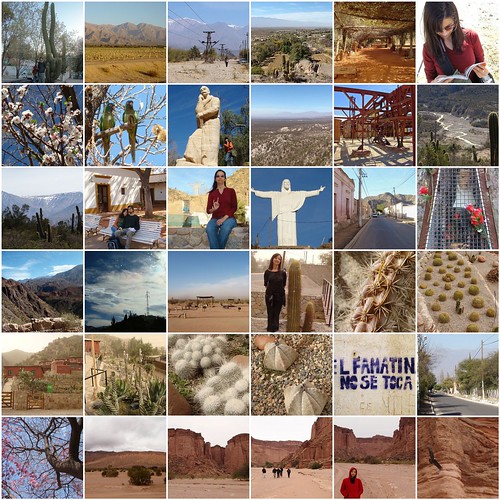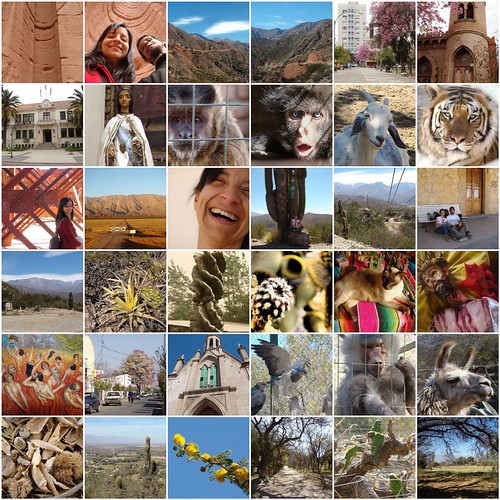Today it's been 25 years since the formal return of democracy in Argentina. On October 20, 1983 a democratically elected president, Raúl Alfonsín, took office after more than seven years of dictatorship and over half a century of erratic shifts between legal presidents and military usurpers.
My personal reckoning is that, although I was born exactly six months after the coup d'état, I have so far spent four fifths of my life under democratic rule. During that time I've voted quite a few times: three times for president (1999, 2003, 2007), four for governor (1995, 1999, 2003, 2007) and many more, at least once every two years to elect national and provincial legislators, and once every four years to elect city mayors and councilmembers, plus a couple of primaries. My generation is possibly the one that has voted the most times during the entire history of this country.
On the national level I've always either voted for the loser... or later regretted not voting for him. During all this time, this thing that gets called "the democratic process" hasn't offered me much satisfaction. But I don't want to despair. Never has Argentina experienced so many years (a quarter of a century!) of uninterrupted free elections on all the levels of government. We move on and crises hit us and sometimes we'd rather have everything blow apart, but in our heart of hearts we know and wish it will go on no matter what.
I have my reservations and my protests in store and readily available, but today I want to end this on a positive note. For 25 years now we've refused, as a people, to be deprived of our right to choose, and even when all our options look bad, we always have one more chance ahead of us. And that counts.
(El texto original de este post, en castellano, está disponible en Sin calma: 25 años de democracia.)
30 October 2008
25 years of democracy
25 October 2008
Image gallery
I've been busy revamping my website these days, which is why I haven't blogged here at all for a week. It's in Spanish, so that's also why I haven't blogged about it here. Anyway, I'm unveiling an image gallery in order to showcase my photos in a different way from that which Flickr offers. The system is not the best to be found, but I can control it some more. The idea is, I will continue sharing pictures of everything that strikes my fancy on Flickr, but I'll keep the more artistic photos for my gallery. I can't (so far) make a trade out of my photos, but this would be a first step towards establishing an online presence as a photographer with a portfolio.
The gallery can be accesed directly at pedeefe.com.ar/gallery2, or embedded into the website at pedeefe.com.ar/site/?q=gallery; the interface is practically the same. Go check it out and leave comments, critiques, or whatever.
14 October 2008
Time displacement
By decree of Our Most Reflective Leader, President Cristina of the Unwrinkled Face, and based on the success of last year's Daylight Saving Time scheme, we'll be advancing our clocks and watches by one hour next Sunday, October 19, at midnight (which will thus become 1 AM). Except of course there was no measurable difference in power usage last year, and all we got from DST was a surge in sleep disorders (and, admittedly, beautiful sunsets at 11 PM beyond the 40°S parallel — almost midnight sun without the expense and inconveniences of a trip to Antarctica).
As usual, it's up to the provincial states to adhere or reject this measure. Four provinces (San Luis, San Juan, La Rioja and Catamarca) are almost sure they won't change the time, while Mendoza has already announced it won't — that is, the whole Cuyo region plus the neighbouring Catamarca will stay behind.
Here in Rosario, as well as in Santa Fe City, business owners are complaining as well, and plan to file a formal request to governor Hermes Binner. Most likely that won't change the decision. It would be rather problematic if Santa Fe stayed behind while all of its neighbours don't.
08 October 2008
Argentina's economy: what now?
Everybody's talking about the financial crisis, so I thought I could chip in with my two cents..., especially seeing how our own Argentine government continues to deny we'll face serious trouble. In fact, President Cristina Kirchner has devoted a lot of time to deride, with barely concealed glee, the proponents of globalized laissez-faire capitalism (we must acknowledge that "kicking them while they're down" never felt better) and to defend the Kirchnerist achievement of decoupling Argentina from international market shocks, which would be terrific — if it were true.
First of all, not to despair: we are, as Cristina says, better prepared than ever in recent history for the shock. The problem started outside our borders (we have different problems) and we'll just have to slow down and wait, hoping that they don't spill into our own economy. For example: we need money to pay our foreign debt next year (and it's a lot of money — more than we owed before Néstor Kirchner renegotiated it, because we actually exchanged debt for more debt), and it'll be difficult to get money from abroad or to refinance the debt once again, with interest rates being so high and everybody clutching desperately to their remaining assets; but we still have a fiscal surplus and a trade surplus.
The peso-dollar rate jumped a bit, too, and that will help the trade surplus. There's just one problem — we're dependent on imports of all kinds, so a higher exchange rate means inflation. And one more problem: the Brazilian real has devalued as well, only much more brutally, so Brazil will be able to sell cheaper stuff to us, they won't be able to buy as much from us, and they'll be much more competitive with respect to third parties. Brazil has a long-standing state policy of industrialization; we don't. Brazil can cope with lower or higher exchange rates; we can't.
Yet more problems: our trade surplus feeds our fiscal surplus, via retenciones (export taxes), especially on soybean products. The price of soybeans (as with other commodities) has taken a deep dive, so that means less revenue from exports. China buys most of our soybeans, but China, like all countries around the globe, will start buying less of everything. Less revenue from exports means less available money to (for example) cover the costs of subsidizing inefficient public services and utilities, and funding public works. The national government has already left the inner country to its own devices, delaying or altogether abandoning plans to build homes, schools and such (Minister De Vido lies, as usual); now it's Buenos Aires's turn. Natural gas, drinking water, domestic power, buses, trains, the subway — they'll go up and up, while construction (the engine of Argentina's economic recovery since 2002) will come to a halt. Tourism and foreign investment will suffer as well; people in the US and Europe simply won't have money to spend on Third World countries like Argentina.
There's a political problem as well, because 2009 is a legislative election year, and the Kirchners doubtless had plans to pour money into cheap, quickly-unveiled public works all over the country, as Peronists are fond of doing; that just won't be possible in this scenario. Least of all if the opposition gets to revise the budget, which contains certain provisions deserving a "best fiction" award, plus the infamous "superpowers" that let the Chief of Cabinet move around huge chapters of the budget under the excuse of an economic emergency that supposedly ended years ago.
All in all, it looks like the next months will bring a "plateau" in Argentina's so far swift growth, and the Kirchnerist government will have to deal, for the first time ever, with a tight budget. It's easy to play when you have cards, as we say over here. The feeling of opportunities for true growth, for industrialization, for true redistribution of wealth, wasted and lost and now unlikely to return for a few years, is almost unbearable.
03 October 2008
Vacations in pictures
Here's a two-volume compilation, totalling 72 pictures, of our trip to Chilecito and La Rioja last month. Click on the mosaics below and, once in the Flickr picture page, click on the individual pictures' titles.














